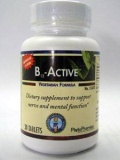| Vitamin B12 deficiency is a common problem that affects the general population and the elderly in particular. An abnormally low level of vitamin B12 (cobalamin) is a factor in many disorders. Vitamin B12, also called cobalamin, is important to good health. Vitamin B12 is essential for normal nervous system function and blood cell production. The main sources of vitamin B12 include meat, eggs, and dairy products. For vitamin B12 to be absorbed by the body, it must bind to intrinsic factor, a protein secreted by
cells in the stomach. It helps maintain healthy nerve cells and red blood cells, and is also needed to make DNA, the genetic material in all cells. Vitamin B12 is bound to the protein in food. Hydrochloric acid in the stomach releases B12 from protein during digestion. Once released, B12 combines with a substance called intrinsic factor (IF) before it is absorbed into the bloodstream.
Vitamin B12 deficiency occurs when there is an abnormally low level of vitamin B12 absorbed in the body. Vitamin B12 deficiency can be a factor in a variety of different health conditions and disorders. B12 deficiency inhibits of severy decrease the bodies ability to produce blood, increases blood cell destruction, and is very harmful to the nervous system. Vitamin B12 deficiency results in impairment of the activities of B12-requiring enzymes. Impaired activity of methionine synthase may result in elevated homocysteine levels, while impaired activity of L-methylmalonyl-CoA mutase results in increased levels of a metabolite of methylmalonyl-CoA, called methylmalonic acid (MMA). Vitamin B12 deficiency impairs the body’s ability to make blood, accelerates blood cell destruction, and damages the nervous system. The result is pernicious anemia (PA). When vitamin B12 is deficient essentially all of the folate becomes trapped as the N5-methylTHF derivative as a result of the loss of functional methionine synthase. This trapping prevents the synthesis of other THF derivatives required for the purine and thymidine nucleotide biosynthesis pathways. Low stomach acid, known as hypochlorhydria, interferes with the absorption of B12 from food but not from supplements. Aging is associated with a decrease in the normal secretion of stomach acid. As a result, some older people with normal levels of intrinsic factor and with no clear cause for malabsorption will become vitamin B12 deficient unless they take at least a few micrograms per day of vitamin B12 from supplements.
Vitamin B12 (cobalamin) plays an important role in DNA synthesis and neurologic function. Persons with the deficiency may be asymptomatic or may have hematologic or neuropsychiatric signs and symptoms. The absorption of dietary vitamin B12 occurs in the small intestine and requires a secretion from the stomach known as intrinsic factor. If intrinsic factor is deficient, absorption of vitamin B12 is severely diminished. Vitamin B12 deficiency may take decades to develop. Most symptoms can occur before the deficiency is severe enough to cause anemia. Characteristic signs of B12 deficiency include fatigue, weakness, nausea, constipation, flatulence (gas), loss of appetite, and weight loss. Symptoms of severe vitamin B12 deficiency (regardless of the cause) may include burning of the tongue, fatigue, weakness, loss of appetite, intermittent constipation and diarrhea, abdominal pain, weight loss, menstrual symptoms, psychological symptoms, and nervous system problems, such as numbness and tingling in the feet and hands.
Neurological complications also are associated with vitamin B12 deficiency and result from a progressive demyelination of nerve cells. The neurologic symptoms of vitamin B12 deficiency include numbness and tingling of the arms and more commonly the legs, difficulty walking, memory loss, disorientation, and dementia, with or without mood changes. Additional symptoms of B12 deficiency are difficulty in maintaining balance, depression, confusion, poor memory, and soreness of the mouth or tongue. Some of these symptoms can also result from a variety of medical conditions other than vitamin B12 deficiency. It is important to have a physician evaluate these symptoms so that appropriate medical care can be given.
A deficiency of vitamin B12 (cobalamin) deficiency can cause pernicious anemia, which is marked by fewer but larger red blood cells. Deficiencies can cause walking and balance disturbances, a loss of vibration sensation, confusion, and even dementia. Pernicious anemia (PA) is the name of the condition that comes about as a result of severe vitamin B12 deficiency. This condition is usually caused by lack of intrinsic factor in the intestine that is required for the body to properly absorb vitamin B12. The liver can store up to six years worth of vitamin B12, hence deficiencies in this vitamin are rare. Pernicious anemia is a megaloblastic anemia resulting from vitamin B12 deficiency that develops as a result a lack of intrinsic factor in the stomach leading to malabsorption of the vitamin. The anemia results from impaired DNA synthesis due to a block in purine and thymidine biosynthesis. The block in nucleotide biosynthesis is a consequence of the effect of vitamin B12 on folate metabolism.
| 